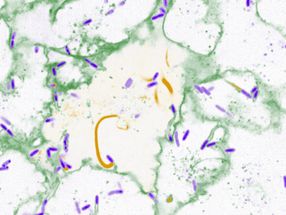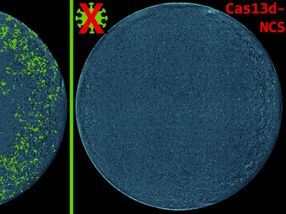One-step test for hepatitis C virus infection developed
UC Irvine Health researchers have developed a cost-effective one-step test that screens, detects and confirms hepatitis C virus (HCV) infections. Current blood-based HCV testing requires two steps and can be expensive, inconvenient and is not widely available or affordable globally.
"Our novel HCV antigen test system has significantly improved sensitivity and specificity over current tests. Importantly, for the first time, we can use urine specimens for one-step screening and diagnosing of HCV infection," said Dr. Ke-Qin Hu, professor of gastroenterology and hepatology at UC Irvine School of Medicine. "Finding a more convenient, easy-to-use and cost-effective screening alternative is imperative, because HCV is significantly under-screened and under-diagnosed."
Although the current HCV screening test is specific and sensitive, it cannot distinguish active infection from a previous infection. A blood sample is required, and two steps are required. First, virus-specific antibodies must be detected in the blood. Then, the sensitive HCV RNA PCR test must be administered to confirm whether or not the infection is active. Hu said many developing countries are not equipped to administer the two-step test, especially the HCV RNA PCR test. In the U.S., its cost is above $200. The novel HCV antigen test system developed by Hu's UC Irvine lab could significantly reduce the cost, human resources and time required for the test results.
"The ability to detect infection using urine rather than blood avoids needle stick and blood sample collection, greatly reduces the cost and necessary clinical infrastructure for screening and diagnosis, helping to promote widespread adoption of the test on a global scale," Hu said.
According to the Centers for Disease Control and Prevention, approximately 150 million people worldwide and 3.2 million people in the U.S. are infected with HCV. Effective screening and fast diagnosis are critical for treatment and controlling transmission.
"Those who are HCV infected can now be cured, before a further liver injury and complications develop, but only if they are diagnosed" Hu said.
People with an HCV infection do not usually experience symptoms until more serious liver injury develops, such as fibrosis, cirrhosis, or liver cancer. The CDC recommends screening tests for high-risk patients, including intravenous drug users, and individuals who had blood transfusions before 1992, as well as those born between 1945 and 1965.
Other news from the department science
Most read news
More news from our other portals
See the theme worlds for related content
Topic world Diagnostics
Diagnostics is at the heart of modern medicine and forms a crucial interface between research and patient care in the biotech and pharmaceutical industries. It not only enables early detection and monitoring of disease, but also plays a central role in individualized medicine by enabling targeted therapies based on an individual's genetic and molecular signature.

Topic world Diagnostics
Diagnostics is at the heart of modern medicine and forms a crucial interface between research and patient care in the biotech and pharmaceutical industries. It not only enables early detection and monitoring of disease, but also plays a central role in individualized medicine by enabling targeted therapies based on an individual's genetic and molecular signature.

























































